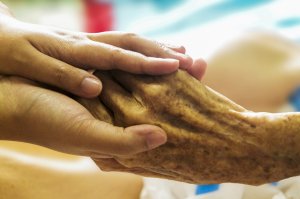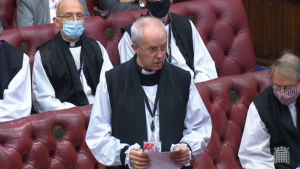We support patient autonomy and work to protect patients from the imposition of other people's personal religious views.
There is widespread support amongst the public for a compassionate law that permits assisted dying under certain circumstances.
But religious lobbying exerts a disproportionate influence on the debate on assisted dying, frustrating much-needed reform.
Assisted dying (AD) is when a person chooses to be given help to die, usually because they are terminally ill and suffering unbearably.
AD is legal in a growing number of countries around the world. In all these jurisdictions there are strict guidelines and safeguards to ensure AD is not misused. Where AD is an option, it complements palliative care rather than replacing it.
AD is not explicitly legal anywhere in the UK. Terminally ill people who wish to end their suffering more quickly have very few options.
Travelling to a country where their death can be assisted legally isn't a viable option for most, due to the high expense and the difficulties in travelling with a terminal illness. What's more, friends and relatives who accompany or help someone travel abroad for AD may be prosecuted.
Terminally ill people in the UK may therefore resort to taking their own life, leading to botched suicides, or asking the help of loved ones. This puts friends and relatives in a horrendous position: either they must watch their loved one suffer, or they must help them die and risk jail in the process.
The largest poll ever conducted on assisted dying found 84% of people in Britain support a change in the law. This includes 82% of Christians and 90% of nonreligious people.
Many regard refusing people a final relief from unbearable suffering as a harmful act. But strong opposition to AD comes from religious leaders who think AD goes against the will of their gods.
We support the democratic right of all people to contribute to the debate on AD. But policy decisions should be guided by evidence, compassion and respect for the principle of patient autonomy, rather than religious dogma. The views of the general public, professionals and relevant organisations should be fairly reflected at policy level.
Within the National Secular Society, individual members hold a range of views about AD. All are agreed that religious privilege should have no place in the decision-making process.
Take action!
1. Write to your MP
Ask your MP to support properly regulated assisted dying.
2. Share your story
Tell us why you support this campaign, and how you are personally affected by the issue. You can also let us know if you would like assistance with a particular issue.
3. Join the National Secular Society
Become a member of the National Secular Society today! Together, we can separate religion and state for greater freedom and fairness.
Latest updates
NSS backs proposals for assisted dying law in Scotland
Posted: Thu, 25 Nov 2021 10:44
The National Secular Society has backed proposals to allow the choice of assisted dying in Scotland.
The NSS has responded to a consultation launched by a member of the Scottish Parliament on proposals for a bill to "enable competent adults who are terminally ill to be provided at their request with assistance to end their life".
Under the proposals in the consultation by Liberal Democrat MSP Liam McArthur, registered healthcare practitioners would be allowed to provide life-ending medication to a patient who has requested an assisted death in writing and who has been diagnosed as terminally ill by two doctors.
There is currently no specific legislation that governs assisted dying in Scotland. However, assisting the death of another may give rise to liability for either murder or culpable homicide.
In its response, the NSS said it was "fully supportive" of the proposals. It said Scotland's law around assisted dying is "particularly ambiguous" and the proposals would "provide for greater safeguards to protect dying people than currently exist."
It said one of the "cruellest consequences" of the lack of legislation to enable assisted dying is that "a dignified and pain-free death for the terminally ill is a luxury only the wealthiest in society can opt for", because the costs of travelling abroad for an assisted death are so high.
The NSS welcomed the consultation's acknowledgement that "freedom of religion and belief protects individuals but not institutions, and protects individuals with non-religious convictions as equally as those with religious beliefs".
The NSS said allowing individuals the choice of an assisted death therefore has "no impact on the religious freedom of those who do not agree with assisted dying", as long as healthcare providers are given the right to conscientious objection.
But it warned allowing for conscientious objection must not leave patients in a position "whereby the healthcare professional is abandoning them because they have chosen a particular reasonable, legal treatment option."
The NSS also warned strong opposition to assisted dying comes from religious leaders, and that the over-representation of religious groups imposes a "disproportionate level of influence" on the assisted dying debate. It said the views of the general public, professionals and relevant organisations "should be fairly reflected at policy level."
The NSS is also supporting a bill to enable legal assisted dying now at committee stage at Westminster.
The deadline to respond to the consultation is 22 December 2021. Members of the public can respond here.
Following the consultation, a final proposal will be lodged in the Scottish Parliament with a view to introducing a Member's Bill if it secures sufficient support.
Bishops’ bench rallies against Assisted Dying Bill
Posted: Tue, 26 Oct 2021 13:41
Anglican bishops in the House of Lords have united to oppose a bill to allow the choice of assisted dying for terminally ill people.
During the second reading of the Assisted Dying Bill on Friday, archbishop of Canterbury Justin Welby (pictured) said there was "unanimity" on the bishops' bench that the law on assisted dying "does not need to be changed".
The bishops' bench consists of 26 Church of England bishops, or 'Lords Spiritual', who are automatically appointed to the House of Lords.
The bill would legalise assisted dying as a choice for terminally ill, mentally competent adults in their final months of life.
The bill passed unopposed following the debate in the House of Lords but is unlikely to progress further without government support.
Religious opposition
Other members of the bishop's bench who voiced their opposition in the debate included Martin Warner, Paul Butler and James Newcome.
Warner, who is the bishop of Chichester, said "God does not inflict evil on people".
Robert Winston said the influence of bishops on the "moral compass" of the assisted dying debate is "extremely important".
Religious objections to the bill were also made by Michael Farmer, who called it "an atheists' Bill, denying God and denying eternity", and Patrick Cormack, who said the bill "does not really acknowledge the fact that many of us believe in the afterlife".
Ranbir Singh Suri equated assisted dying with suicide which he called "a crime against our maker, almighty God, and nature".
Citing Sikh religious texts, Suri said: "We have to accept the will of almighty God".
Support for the bill
Molly Meacher, who tabled the bill, said it was "overwhelmingly popular" in society and supported by 84% of the population, including 80% of people who declare themselves religious. She said this was "not surprising" because "the sole aim of this Bill is to reduce unnecessary and unbearable suffering."
Supporters also included former archbishop of Canterbury George Carey, who said: "I may be out of step with the House of Bishops, but I think it is out of step with the vast majority of our nation, including many of its own membership."
Other supporters who proclaimed Christian faith in the debate included Ruth Davidson, Sal Brinton, Nigel Vinson and Gus O'Donnell.
Several other supporters stressed the bill would not compel those with religious or other objections to assisted dying to take any part in the process.
Ann Mallalieu said: "However strong your personal view, whether based on religious belief, personal experience or strong convictions about the sanctity of human life, is it right for you as an individual to insist that your view prevails when it will prolong intolerable suffering for someone else who happens to hold a different view?"
NSS comment
National Secular Society chief executive Stephen Evans said: "This debate has again highlighted the role of religion in restricting people's freedom and choices when it comes to end-of-life decisions.
"Opposition to assisted dying is often rooted in conservative religious views. Those views should not be given undue weight in parliament. Yet this is precisely what having religious appointees in our legislature does.
"On this issue, the bishops' bench is not only out of step with the views of the general population – it is even out of step with most of its own congregation.
"It's time to end the pretence that senior Anglican clerics have some kind of special moral authority that justifies their privileged place in parliament. All the bishops' bench does is undermine democracy by promoting the narrow interests of religious elites. This debate is a good example of why scrapping the bishops' bench is long overdue."
Notes
- The United Kingdom is unique among Western democracies in giving representatives of religious groups automatic seats in its legislature. The only other country that does this is Iran.
- In September the British Medical Association, which represents about 150,000 medics, voted to adopt a position of neutrality on physician-assisted dying at its annual representative meeting.




